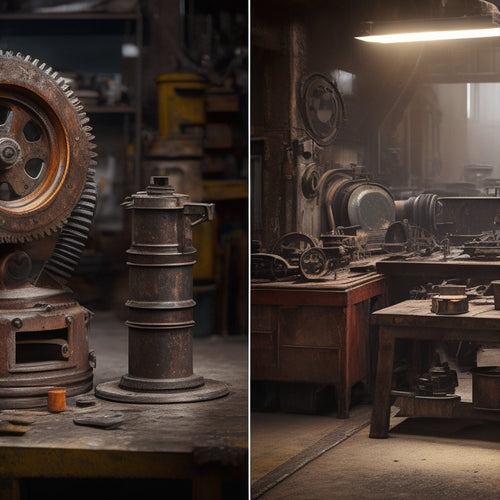
What's the Cost of a Small Solar System for Your Home?
Share
You can expect to pay between $15,000 to $30,000 for a small solar system, typically ranging from 2 to 5 kilowatts, which is ideal for homes with moderate energy consumption. Factors like system size, solar panel efficiency, and installation complexity impact the cost. Local incentives, such as rebates and tax credits, can also reduce the net cost. While financing options and long-term benefits like energy independence and excess energy sales contribute to the overall value, understanding the cost breakdown and installation timeline can help you make an informed decision. As you investigate your options, you'll uncover what's right for your budget and energy needs.
Key Takeaways
- The average cost of a small solar system (2-5 kW) ranges from $15,000 to $30,000, depending on system size, panel efficiency, and installation complexity.
- Solar panels account for the largest portion of overall costs, ranging from $2.50 to $3.50 per watt, while inverters and mounting hardware add to the total expense.
- Installation costs, including labor and fees, can range from $15,000 to $21,000 for a 5-kilowatt system, depending on the installer and location.
- Federal and state incentives, such as tax credits and rebates, can significantly reduce the upfront cost of a small solar system, making it more affordable.
- Long-term savings and ROI can be substantial, with energy bill reductions and minimal maintenance costs, making a small solar system a smart investment for homeowners.
Understanding Solar System Costs
Understanding Solar System Costs
Typically, homeowners evaluating a small solar system for their home are most concerned about one thing: the cost. You're likely wondering what you'll pay for the system, how you'll finance it, and what benefits you'll reap.
With advancements in solar technology, the cost of solar systems has decreased, making them more accessible. You can investigate financing options, such as loans or power purchase agreements, to make your system more affordable.
Beyond the upfront cost, you'll want to contemplate the long-term benefits. Solar systems provide environmental benefits, energy independence, and can even increase your property value.
When you connect your system to the grid, you can sell excess energy back to your utility company. You may also opt for battery storage to store excess energy for later use.
Be sure to research local regulations and installation timelines to guarantee a smooth process. Additionally, look for system warranties and performance monitoring to ascertain your system operates efficiently.
Factors Affecting System Pricing
Several factors influence the final cost of a small solar system for your home. You'll need to evaluate these variables to get an accurate estimate for your project.
| Factor | Impact on Cost |
|---|---|
| System Size | Larger systems cost more, but are more cost-effective per watt |
| Solar Panel Efficiency | Higher-efficiency panels cost more, but require less space |
| Installation Complexity | Rooftop installations are generally cheaper than ground-mounted systems |
| Financing Options | Loans and leases can increase the upfront cost or monthly payments |
| Local Incentives | Rebates, tax credits, and other incentives can reduce the net cost |
Your location, local building codes, and the quality of equipment and installation services also play a role in determining the final cost. Additionally, the type and efficiency of solar panels, as well as the complexity of the installation, will impact the overall price. Understanding these factors will help you make informed decisions and get the best value for your money.
Typical System Sizes for Homes
Your home's energy needs dictate the ideal solar system size, which typically ranges from 2 to 10 kilowatts (kW). This range is influenced by factors such as your energy consumption, roof size, and local building codes.
A smaller system, around 2-3 kW, is suitable for homes with low energy consumption, while larger systems, up to 10 kW, cater to homes with higher energy demands.
The type of solar panel you choose also impacts the system size. For instance, high-efficiency panels can generate more power per panel, resulting in a smaller system size. Conversely, lower-efficiency panels may require more panels to achieve the same energy output, increasing the system size.
To determine the ideal system size for your home, assess your energy consumption by reviewing your past utility bills.
A solar panel professional can then help you design a system that meets your specific energy needs. By choosing the right system size, you can maximize your energy savings and reduce your reliance on the grid.
Average Cost of Small Systems
How much will a small solar system set you back? The average cost of a small solar system for your home depends on several factors, including the type and quality of solar panels, installation costs, and financing options.
On average, a small solar system with a capacity of 2-5 kilowatts (kW) can cost anywhere from $15,000 to $30,000. However, with the rise of affordable solar panel types, such as polycrystalline and thin-film panels, prices have decreased considerably.
High-efficiency monocrystalline panels, on the other hand, are more expensive.
Financing options can also impact the overall cost. You can choose to purchase the system outright, finance it through a loan, or lease it from a third-party provider.
Additionally, many governments offer incentives, such as tax credits, to encourage homeowners to adopt renewable energy sources. By exploring these options, you can find a small solar system that fits your budget and meets your energy needs.
Cost Breakdown of Components
Installed on your rooftop, the solar panels themselves account for the largest portion of the overall cost, ranging from $2.50 to $3.50 per watt, depending on the type and quality.
High-efficiency panels with superior component quality will cost more, but they'll also generate more power per hour of sunlight.
The inverter, which converts DC power from the panels to AC power for your home, accounts for around 10% of the total cost.
You'll pay between $0.10 and $0.20 per watt for a high-quality inverter with a long equipment warranty.
Mounting hardware, including racking and tracking systems, adds another 10% to the total cost.
These components guarantee your panels are securely fastened to your roof and angled for peak energy production.
Installation Costs and Fees
You'll also need to contemplate the costs associated with getting your small solar system up and running.
These installation costs and fees include system design and engineering, which involves tailoring the system to your home's specific energy needs.
Additionally, you'll need to factor in permit and inspection fees, as well as labor and installation costs, which can vary depending on your location and the complexity of the installation.
System Design and Engineering
When planning a small solar system for your home, system design and engineering play an essential role in guaranteeing a safe and efficient installation. This involves evaluating your energy needs, appraising your roof's solar potential, and determining the ideal system size and configuration.
Your solar installer will consider various design considerations, such as the type and number of solar panels, inverter selection, and mounting options.
To maximize system efficiency, your installer will also evaluate your home's electrical infrastructure, including the electrical panel and wiring. They'll make sure that the system is designed to meet your energy demands, considering factors like shading, roof orientation, and local building codes.
A well-designed system won't only generate more power but also reduce the risk of system failures and maintenance issues. By investing in a properly designed and engineered system, you'll be able to enjoy the full benefits of solar energy for years to come.
Permit and Inspection Fees
Your solar installer must maneuver a complex web of regulations and permits before flipping the switch on your new solar system, and these necessary steps come with a cost.
As a homeowner, you'll need to factor in the cost of obtaining necessary permits, which vary by jurisdiction. Typically, you'll need to secure electrical, building, and zoning permits. The cost of these permits ranges from $500 to $2,000, depending on your location and the complexity of your solar system.
In addition to permit fees, you'll also need to budget for inspection requirements. Inspectors will verify that your solar system meets local building codes and safety standards.
Inspection fees typically range from $200 to $500, depending on the number of inspections required. It's crucial to work with a reputable solar installer who's familiar with local regulations and can guide you through the permitting and inspection process.
Labor and Installation
The installation process is where the bulk of the cost of a small solar system comes into play, with labor and installation fees accounting for a significant portion of the overall expense.
As you prepare to install your solar system, it's vital to understand the installation timeline and the factors that affect labor quality.
The installation timeline typically ranges from a few days to several weeks, depending on the complexity of the project and the number of professionals involved. A standard installation may take around 3-5 days, while a more elaborate system may require up to 2 weeks.
Labor quality is fundamental in ensuring a safe and efficient installation. Look for experienced installers who are certified by reputable organizations, such as the North American Board of Certified Energy Practitioners (NABCEP).
Labor and installation fees can vary depending on the location, system size, and installer's rates. On average, you can expect to pay between $2.50 and $3.50 per watt, which translates to around $15,000 to $21,000 for a 5-kilowatt system.
Keep in mind that high-quality labor and installation may cost more upfront, but it can lead to long-term savings and a more reliable system.
Federal and State Incentives
Investing in a small solar system for your home can greatly benefit from federal and state incentives, which can help offset the upfront costs.
You're eligible for a federal tax credit of 26% of the total system cost, which can considerably reduce your taxable income. For example, if your system costs $15,000, you can claim a federal credit of $3,900.
Additionally, many states offer rebates and incentives to encourage homeowners to adopt solar energy. These state-specific programs can provide a one-time rebate or credit towards your system purchase.
You can check with your state's energy office or public utility commission to see what incentives are available in your area. Some states also offer property tax exemptions or sales tax exemptions, which can further reduce your costs.
Long-Term Savings and ROI
When you install a small solar system, you can expect significant energy bill reductions, which will help offset the initial investment.
By analyzing your payback period, you'll be able to determine how long it'll take for the system to pay for itself through electricity savings.
As you'll soon see, the long-term savings and ROI of a small solar system can be substantial, making it a smart investment for your home.
Energy Bill Reduction
Slash your energy bills by utilizing the power of the sun, and reap the long-term financial benefits that come with it. As a homeowner, you're likely tired of watching your hard-earned money go towards electricity costs.
With a small solar system, you can greatly reduce your energy bills and enjoy the perks of energy independence.
Here are some benefits you can expect:
-
Lower Energy Bills: Produce your own clean energy and reduce your reliance on the grid, leading to lower energy bills.
-
Increased Property Value: Installing a solar system can increase your property value, making your home more attractive to potential buyers.
-
Environmental Benefits: Reduce your carbon footprint and contribute to a cleaner environment.
-
Government Incentives: Take advantage of tax credits and rebates offered by the government for switching to renewable energy.
-
Long-Term Savings: Enjoy long-term savings with minimal maintenance costs and a system that can last up to 25 years or more.
Payback Period Analysis
As you evaluate the benefits of a small solar system for your home, you're likely wondering how long it'll take to recoup your investment. This is where payback period analysis comes in – a vital step in determining the long-term savings and return on investment (ROI) of your solar system.
When calculating the payback period, you'll need to assess factors like the upfront cost of the system, financing options such as solar loans or leasing agreements, and the amount of energy you'll produce.
With energy storage, you can maximize your energy efficiency and reduce your reliance on the grid, leading to greater grid independence.
Maintenance and Repair Costs
While enjoying the benefits of renewable energy, you should also take into account the maintenance and repair costs associated with a small solar system for your home. These costs can vary depending on the system's size, quality, and your level of involvement.
Here are some key factors to keep in mind:
-
Routine upkeep: Regular cleaning of the panels and monitoring the system's performance can help prevent issues and guarantee peak energy production.
-
Unexpected repairs: Although rare, unexpected repairs can occur, and it's crucial to have a plan in place for when they do, including budgeting for professional services.
-
Solar warranties: Understanding the terms of your solar warranties can help you prepare for potential repairs and replacements.
-
Performance monitoring: Keeping an eye on your system's performance can help identify issues early, reducing the likelihood of costly repairs.
-
Equipment lifespan: Knowing the average lifespan of your equipment can help you plan for replacements and budget accordingly.
Comparing Quotes and Vendors
How thoroughly have you researched and vetted potential vendors to verify you're getting the best deal for your small solar system? Comparing quotes and vendors is vital in ascertaining you get a high-quality system at a competitive price.
Start by researching local vendors and reviewing their reputation online. Check for certifications, such as NABCEP certification, and read customer reviews to gauge their quality of work.
When requesting quotes, provide each vendor with the same project details to guarantee accurate comparisons. Pay attention to the type and quality of equipment, installation methods, and warranties offered.
Compare the quotes based on the total cost, including installation, maintenance, and repair costs over the system's lifespan. Be wary of low-ball quotes, as they may indicate low-quality equipment or incomplete installations.
Evaluate each vendor's quote based on the equipment's efficiency, durability, and performance. Check if they provide monitoring and maintenance services, and what kind of support they offer in case of issues.
Frequently Asked Questions
Can I Install a Small Solar System on My Rental Property?
You'll need to review your rental agreements and obtain your landlord's permission before installing a small solar system on your rental property, ensuring you understand any restrictions and responsibilities.
Are Energy Storage Batteries Included in the Overall System Cost?
You'll find that energy storage batteries are often quoted separately, affecting overall system cost. Battery pricing varies depending on capacity and brand, while installation options, like AC-coupled or DC-coupled systems, also impact the final bill.
How Long Does It Take to Install a Small Solar System?
You'll typically spend 2-5 days on installation, depending on your roof's complexity and local permits. Be prepared for potential installation challenges, such as weather delays or tricky roof access, which can impact your installation timeline.
Can I DIY Install a Small Solar System for My Home?
You can DIY install a small solar system, but it's essential you choose the right solar panel types and have the necessary installation tools, such as a drill, wrench, and voltage tester, to guarantee a safe and efficient installation process.
Will a Small Solar System Work During a Power Outage?
You'll be surprised to know that 70% of solar panels still produce energy during a power outage, but a small solar system won't power your home during an outage unless you have a battery backup, which affects overall solar efficiency.
Related Posts
-

Why Higher Upfront Costs Are Worth It
You pay a premium for high-quality, energy-efficient products, but they're worth it. With durability testing ensuring...
-

Safety First: Why Seniors Need Advanced Vehicle Features
As you get behind the wheel, you're likely unaware that seniors are 16% more likely to be involved in a fatal car cra...
-

What Makes a Road Bike-Friendly by Design?
As you plan and design roads, incorporating features like dedicated bike lanes, smooth surfaces, and traffic calming ...


